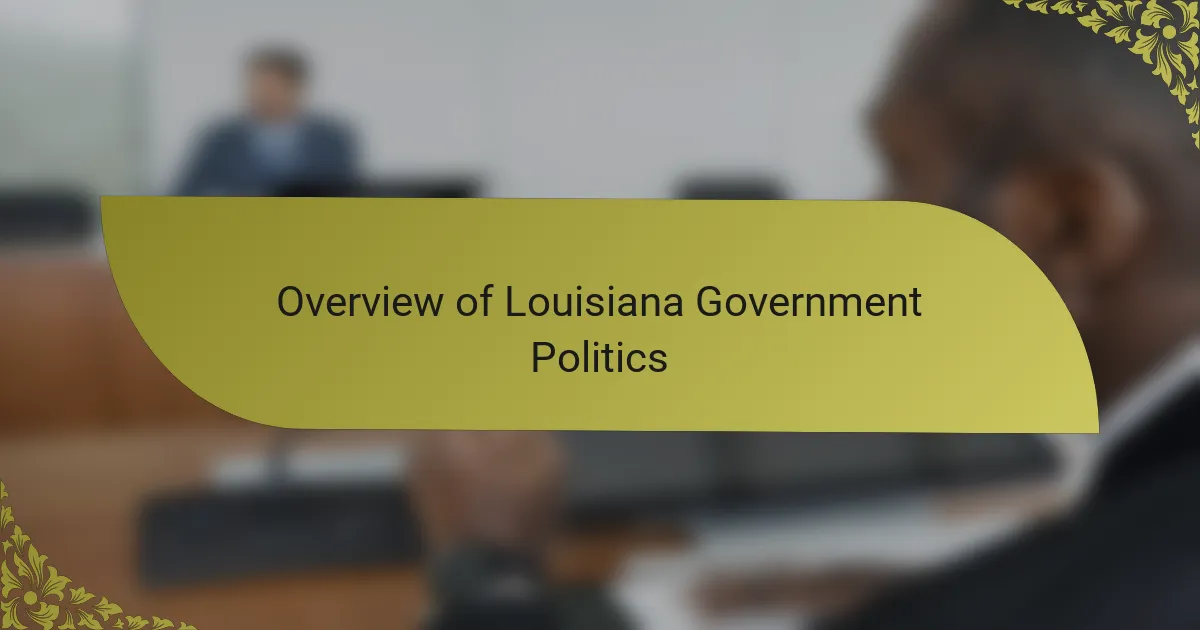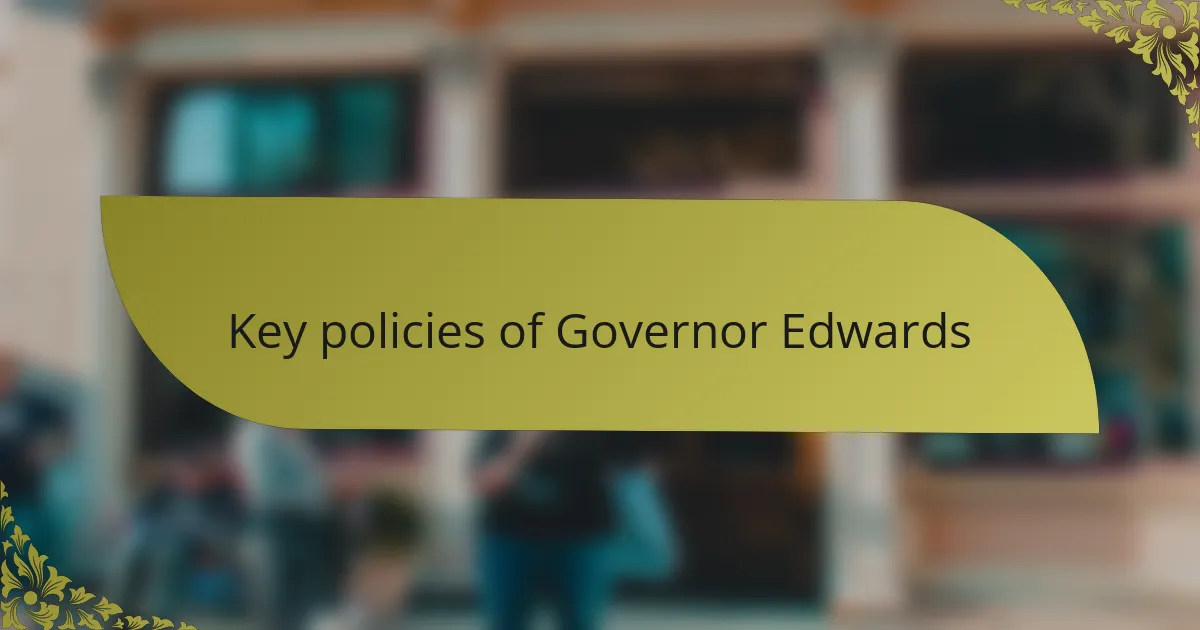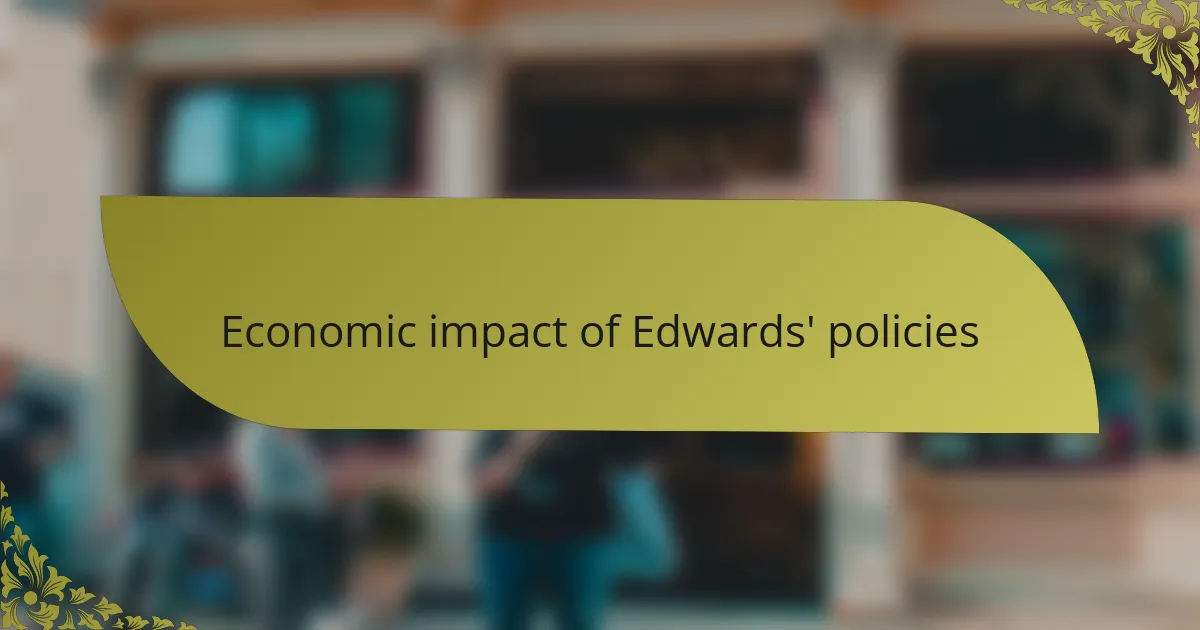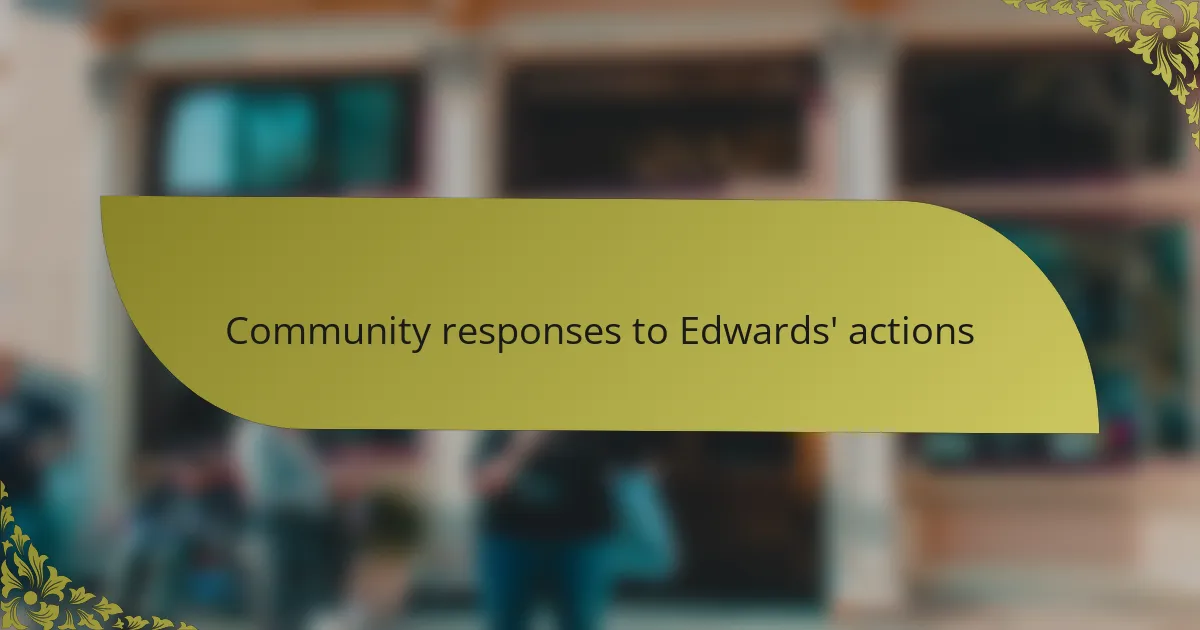Key takeaways
- Governor Edwards’ policies have significantly expanded Medicaid, improving healthcare access for over 500,000 low-income residents in Louisiana.
- Increased funding for education, including teacher pay raises and early childhood programs, has generated enthusiasm among educators and positively impacted students.
- Community engagement is crucial, with local responses reflecting appreciation for Medicaid expansion but concerns about the pace of educational reforms and infrastructure improvements.
- Targeted tax incentives and infrastructure development initiatives have stimulated economic activity, benefiting local businesses and creating jobs.

Overview of Louisiana government politics
Louisiana government politics is a vibrant mix of tradition and innovation, reflecting the unique culture of the state. Growing up in Louisiana, I remember how deeply local politics resonate with communities, often shaping daily life in unexpected ways. It’s fascinating to see how policies introduced by leaders like Governor Edwards aim to bridge the gap between historic challenges and modern solutions.
Throughout my experiences observing Louisiana’s political landscape, I’ve noticed a few key elements that stand out:
- Deep-rooted traditions influence political discourse.
- Local issues often take precedence over national discussions.
- A diverse electorate shapes varied policy priorities.
- Economic disparities significantly impact governance and policy implementation.
- Community engagement plays a crucial role in local politics.
These aspects highlight the pulse of Louisiana’s political arena, reminding us that at the core, the government reflects the hopes and aspirations of its citizens.

Key policies of Governor Edwards
Governor Edwards’ policies reflect a strong emphasis on healthcare and education, areas that resonate deeply with many Louisianans. I remember attending a community meeting where families expressed their gratitude for the expanded Medicaid program—many had previously struggled without health insurance. The tangible impact of this initiative became clear, as lives were transformed, giving residents access to essential medical services.
In addition to healthcare reforms, his administration has focused on improving education by increasing teacher salaries and enhancing funding for early childhood education. Witnessing the enthusiasm of teachers at local schools was inspiring; they felt valued and supported, which I believe is crucial for the future of our children.
Here are some key policies implemented during Governor Edwards’ tenure:
- Expansion of Medicaid, providing health coverage to hundreds of thousands of uninsured Louisianans.
- Increased funding for K-12 education, enabling better resources and facilities for students.
- Comprehensive criminal justice reform aimed at reducing incarceration rates and promoting rehabilitation.
- Support for infrastructure development, addressing the urgent need for repairs and upgrades to roads and bridges.
- Initiatives to boost the economy, including support for small businesses and job creation programs.
These policies highlight his commitment to addressing some of the state’s most pressing issues.

Economic impact of Edwards’ policies
Governor Edwards’ policies have had a substantial economic impact on Louisiana, particularly through initiatives aimed at improving healthcare and education funding. I remember attending a town hall meeting where community members expressed their relief at the expanded Medicaid program, which allowed many to access necessary healthcare services. This was not just a policy change; it was a lifeline for families who had long struggled with medical bills and inadequate care.
Furthermore, I’ve seen local businesses benefit from targeted tax incentives designed to stimulate investment. When these incentive programs were introduced, several entrepreneurs in my area seized the opportunity to expand their operations, creating jobs and revitalizing neighborhoods. It really highlighted how thoughtful policies can pave the way for community growth and resilience.
- Expanded Medicaid access, increasing healthcare coverage for low-income residents
- Tax incentives that encouraged investment in local businesses
- Increased funding for education and workforce development programs
- Infrastructure improvements that fostered economic activity in rural areas
- Support for renewable energy initiatives boosting job creation in a growing sector

Social initiatives under Edwards’ leadership
Under Governor Edwards’ leadership, I’ve seen a passionate push for social initiatives. One notable example is the expansion of Medicaid, which has profoundly affected my community. Many of my friends and family members gained access to healthcare for the first time, and I can genuinely say that it’s improved lives.
Another initiative that stands out is the focus on education, particularly in early childhood development. I’ve witnessed firsthand how these programs uplift families and prepare children for success. It’s heartening to see the state invest in our future generations.
Here’s a comparison table illustrating some key social initiatives under Edwards’ administration:
| Initiative | Description |
|---|---|
| Medicaid Expansion | Provided healthcare coverage to over 500,000 low-income individuals. |
| Early Childhood Education | Increased funding for early childhood programs, improving access and quality. |

Personal reflections on policy effectiveness
Reflecting on the effectiveness of Governor Edwards’ policies, I can’t help but think about the people I’ve met whose lives have changed significantly. The expansion of Medicaid truly stands out to me; it felt like witnessing a miracle when friends who once hesitated to seek medical care finally received treatment. How incredible is it that policies can create such shifts in everyday lives, restoring health and hope?
Education reform has also left a lasting impression on me. I remember chatting with a teacher who expressed immense pride in her work after receiving a much-deserved pay raise. This newfound recognition energizes educators, and I truly believe that motivated teachers can inspire students to reach new heights. It’s amazing what a bit of gratitude and support can ignite in our local schools.
Moreover, the focus on community engagement has shaped my perspective on governance. I participated in neighborhood forums where residents openly discussed their concerns and aspirations. It struck me that when institutions and communities collaborate, policies can indeed reflect the collective voice of the people. How often do we see such meaningful dialogue in politics today? It’s moments like these that illustrate the power of inclusive policymaking.

Community responses to Edwards’ actions
Community responses to Governor Edwards’ policies have been varied and deeply felt. I’ve attended numerous local meetings where constituents voiced their appreciation, especially regarding the expanded Medicaid program. It was heartwarming to hear stories of families who finally felt at ease with their healthcare needs—what a relief it must be to know you can get help without crippling debt hanging over your head!
On the flip side, several community members have expressed frustration over the pace of educational reforms. While many support the teacher pay raises, I’ve heard concerns about lingering issues in funding for classroom resources. Some teachers I know still struggle to provide students with basic supplies. Have we truly done enough to support our educators in the long run?
Another significant reaction I observed was during a local rally advocating for better infrastructure. It was inspiring to see neighbors come together, passionately discussing the state of our roads and bridges. People in attendance shared their daily struggles commuting, highlighting how critical these improvements are not only for safety but also for economic growth. Isn’t it vital that we continue to push for these essential upgrades?